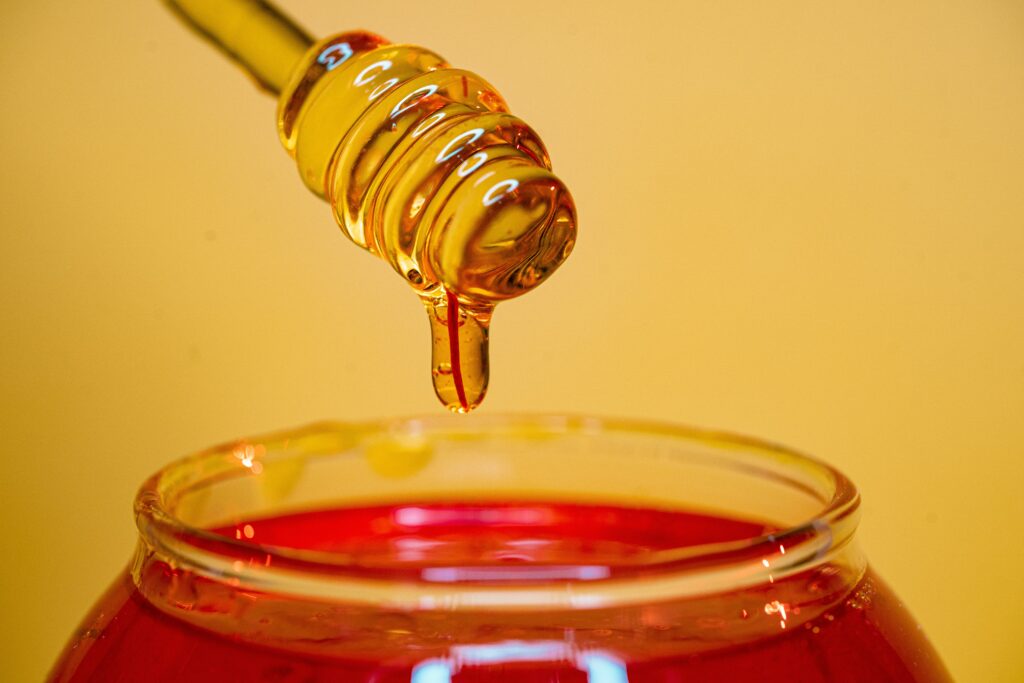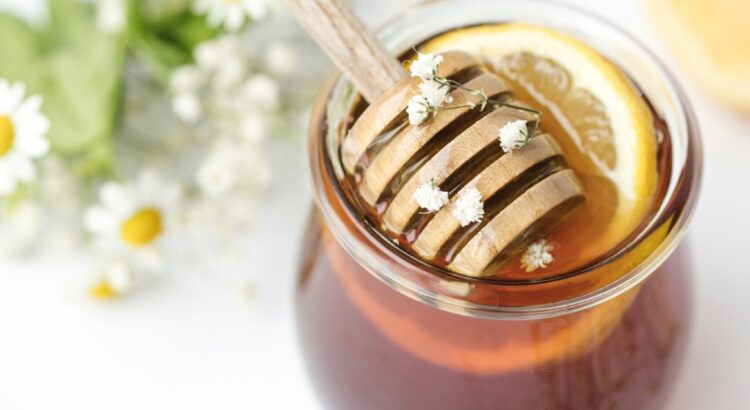Please read the following post for important information on how I’ve chosen my recommendations:
TLDR: There’s no such thing as sustainable, healthy/safe-for-you honey. Buy vegan honey. It tastes the same.
Why you should care: Honestly, collecting honey on a commercial scale isn’t good for bees. Small honey purveyors don’t pasteurize their honey, which means you’re at a higher risk for illness and there’s nobody regulating their practices. BUT, not everyone cares about bees or pasteurization. So then the best reason NOT to eat honey is because most honey is polluted with nasty chemicals.
What you should buy: https://mellodyfoods.com (Mellody is my fav! But there are cheaper options: https://www.walmart.com/ip/Wholesome-Yum-Zero-Sugar-Honey-Substitute-with-Monk-Fruit-Allulose-Sugar-Free-Honey-Alternative-11-oz/) Or you can make your own: https://milkandpop.com/vegan-honey-made-with-apples-and-chamomile/#ingredients (It really does taste just like honey!)
I eat a lot of honey—and I mean a LOT. It’s one of my guilty pleasures. I love it in my tea every day and drizzled on top of my cereal. Of course, it’s a staple of my PB&H sandwiches. So when I started doing research on honey, I figured I’d get something more sustainable. You know, switch to glass jars or whatever, and then call it a day. NOPE.
It turns out that this is WAY more complicated than I thought. There are four different types of honey (that I know of!). https://www.leaf.tv/articles/what-are-the-differences-between-raw-pure-natural-honey/ If a label says “natural honey” it means there are no artificial additives, but some companies still add non-artificial stuff like sugar, etc. “Pure honey” on a label means there are no additives at all, even natural ones. “Raw honey” means the honey hasn’t been pasteurized and has no additives. And “organic honey” means the honey has supposedly followed organic regulations. But here’s the kicker: the organic regulations are based on the specific country the honey comes from. And only about a quarter of all US honey comes from the US. That means the word “organic” is essentially meaningless (unless you happen to know about organic certifications all around the world).
Actually, ALL these labels are meaningless. That’s because the FDA has recommendations for labeling but no requirements. So companies can use whatever words they want and the onus is on the consumer to figure out what they actually mean. WILD! https://www.fda.gov/regulatory-information/search-fda-guidance-documents/guidance-industry-proper-labeling-honey-and-honey-products

But, for the sake of argument, let’s pretend all these companies are abiding by the “rules” I listed above. What’s the deal with raw honey? Why don’t we pasteurize it?
People like raw honey because they think it has more health benefits. This hasn’t been proven in any studies large enough to actually mean anything. https://www.medicalnewstoday.com/articles/324966#how-to-find and https://www.healthline.com/health/allergies/honey-remedy#research and https://www.healthline.com/health/botulism-honey
Honey is pasteurized for the same reason we pasteurize stuff like milk. It has bacteria in it that’s harmful to our health such as botulism. We all know that infants can’t have honey because of botulism, which is present throughout the entire honey making process: https://pubmed.ncbi.nlm.nih.gov/16689729/ But can adults get sick because of it? Some researchers say yes and others say no. https://www.sciencedirect.com/science/article/abs/pii/S107599642200124X?via%3Dihub
It seems to me that if you have any health issues or a history of stomach/intestinal issues, then you should steer clear of raw honey. I tend to be super cautious about what I put in my body so I like my honey pasteurized and bacteria-free.
OK, so you need to choose a type of honey AND THEN you can just buy it, right? NOPE. That’s because most honey is contaminated with a weed killer chemical called glyphosate. And government agencies don’t regularly check for it. https://www.huffpost.com/entry/fda-finds-monsantos-weed_b_12008680
Beeswax, which is used in lots of cosmetics, also contains harmful chemicals.
https://www.sciencedirect.com/science/article/abs/pii/S0278691523002089 and https://www.sciencedirect.com/science/article/abs/pii/S0048969719353045
The research just isn’t there to determine if ingesting glyphosate is a huge, red light problem. But after reading some studies, I personally feel like the health risks just aren’t worth it. Ingesting part of a weed killer isn’t safe: https://www.healthline.com/nutrition/roundup-glyphosate-and-health#TOC_TITLE_HDR_3 and https://www.texasorganicresearchcenter.org/organic-research-page/List-of-Products-and-Foods-that-Tested-Positive-for-Glyphosate_vq13490.htm
In this case, it’s actually not the beekeeper’s fault. They can offer their bees an organic field of flowers but if the bees fly over to a neighboring field that uses weed killer OR if some of that weed killer gets in the breeze and onto the beekeeper’s field… basically it’s a nightmare to track.

Then there’s bee safety. Beekeepers are only supposed to harvest excess honey, since bees rely on the stuff they make. Some beekeepers are good about it, others probably aren’t. There’s really no way to tell.
The majority of bees that make sellable honey are not native and they compete with native bees for pollen. This can starve out native bees, which pollinate a lot of our local crops, flowers and gardens and can lead to big ecological issues. https://nsojournals.onlinelibrary.wiley.com/doi/abs/10.1111/oik.08915
In conclusion, it’s a huge mess, and you really shouldn’t be eating honey of any type. Instead, go for vegan honey, which is made of plants. https://www.bonappetit.com/story/vegan-honey
More stuff I read:
https://www.ethicalconsumer.org/food-drink/shopping-guide/honey (if you live in the UK)
https://yoursustainableguide.com/glyphosate-free-honey-brands/
https://www.thehonestconsumer.com/blog/organic-honey
https://detoxproject.org/certification/glyphosate-residue-free/certified-products
https://mellodyfoods.com/pages/faq
https://www.bonappetit.com/story/vegan-honey
https://www.organicauthority.com/buzz-news/american-honey-tainted-with-twice-the-legal-eu-limit-of-glyphosate-fda-documents-show
https://usrtk.org/pesticides/fda-finds-monsanto-glyphosate-in-honey/
https://usrtk.org/pesticides/more-bad-news-for-honey-as-u-s-seeks-to-get-handle-on-glyphosate-residues-in-foods/
https://www.greenchoicenow.com/v/organic-honey
https://usrtk.org/pesticides/glyphosate-health-concerns/
https://www.huffpost.com/entry/more-bad-news-for-honey-a_b_12769698
https://thebeet.com/bee-keepers-love-bees-a-beekeeper-sets-the-record-straight-about-honey/
https://www.keepingbackyardbees.com/overharvesting-honey/
https://www.beeawarebrisbane.org/native-bees-vs-honeybees-key-differences-explained/
https://americanbeejournal.com/when-do-honey-bees-compete-with-native-wild-bees/
Photo Credit: featured image: Heather Barnes, honey drip: Benyamin Bohlouli, bee flower: Aaron Burden
